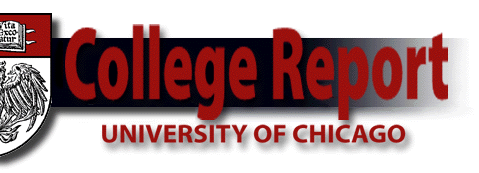|

U
of C students prove they really do know it all
Question: At which Midwestern university would it be unwise to
join a game of Trivial Pursuit?
Answer: the University of Chicago—especially now that the school
is home to both a Jeopardy! College Championship winner and the
national champion College Bowl team.
Third-year Carolyn Cracraft won the quiz show’s 11th annual
college tournament in an episode that aired May 14. Also this spring,
the U of C College Bowl team capped a record-setting year with a
win at the Academic Competition Federation’s (ACF) national
playoffs.
Cracraft’s conquest started back in early March when Jeopardy!
scouts set up shop in the Reynolds Club, where nearly 3,000 students
showed up to claim one of 280 audition spots. A ten-question pre-qualifying
survey and a 50-question follow-up exam whittled the field down
to 45 students, who participated in a mock show proctored by a videotaped
Alex Trebek. They were evaluated for TV friendliness as well as
smarts. As contest coordinator Susanne Thurber told the Chicago
Sun-Times, “You can have a mind packed with knowledge,
but if you come off as a dud, who wants to watch you?”
Fifteen students representing 14 schools from across the country—including
two from Northwestern and one from the University of Illinois—were
selected to compete in the televised rounds of competition, taped
over the second weekend in April at Chicago’s Rosemont Theatre.
The first five shows narrowed the field to nine semifinalists: the
winner of each show, plus the four highest money earners. The next
three shows reduced the field to three contestants—among them
Chicago’s Cracraft—who then competed in the final two-game
match.
Cracraft benefited from home-court advantage during the taping,
cheered on by her family, a swarm of U of C students, and even Dean
of Students Katie Nash. For winning the competition, Cracraft received
a 1999 Volvo C70 convertible, $25,000 in cash, and a trophy.
Cracraft, who’s concentrating in Near Eastern languages and
civilizations, attributes her success to a job at the campus bookstore
and the enthusiastic support of her family, who helped her prepare
by faxing her questions in the weeks before the final rounds of
competition. Each member of the family concentrated on a different
discipline: Her dad tackled famous scientists; her uncle drilled
her on the Old Testament; her aunt handled culinary questions; and
her sister reviewed American literature. The night before the taping
began, she and her family holed up in a hotel room and ran through
questions from home versions of the game show.
“We played Trivial Pursuit when we ran out of that,”
Cracraft told the Sun-Times. “It was, ‘let’s
learn every president, every major battle of the Civil War, and
everything Shakespeare wrote—in one night.’”
Other U of C students have also successfully tested their minutia
mettle. The last weekend in April, the University’s 30-member
College Bowl team became the first in the nation to capture the
intellectual sport’s triple crown when they hosted, dominated,
and won the ACF playoffs. Earlier in the season, they had won the
National Academic Quiz Tournaments (NAQT) Intercollegiate Championship
and the College Bowl, Inc. (CBI) National Championship Tournament.
College Bowl competitions pit teams from schools across the country
against each other in divisional round-robin competition. Each competition,
the U of C typically enters two or three teams of four players.
During a match, any player on either of the two opposing teams may
buzz in at any time during or after the moderator reads a tossup
question. If that player answers correctly, the team can then work
together to solve a bonus question.
Subtle differences in the tournament formats cause teams to approach
each competition with a different strategy. The NAQT format, for
example, awards “power points” for correctly answering
a question before a secret, previously determined point during its
delivery. The ACF competition features the “blitz rule,”
in which an answer may be presented as part of two or three linked
pieces of correct information. If, for example, the moderator began
“On April 6, 1862...” a player could buzz in and say,
“Grant defeated Johnston at the Battle of Shiloh or Pittsburgh
Landing in Tennessee.”
The competitions also cover distinct types of information. “The
different knowledge sets required by the three national tournaments
make winning the triple crown especially difficult,” explains
team president Mike Zarren, a fourth-year. While the ACF national
championship is based primarily on academic information, the CBI
match focuses on pop culture and current events. The NAQT tournament
draws on both academic and popular knowledge. “We’re lucky
that we have such a wide range of people,” he says. “No
one person was on all three national championship teams.”
During the past decade, the U of C team has cemented its reputation
as a College Bowl juggernaut, winning all three major championships
at least twice. “There’s no question that there’s
an ongoing tradition here that other schools don’t have,”
Zarren explains. “The kinds of people who tend to come to the
U of C are those who are interested in learning and knowledge—qualities
necessary to becoming a good College Bowl player.” Heading
the ACF-winning team was humanities graduate student Andrew Yaphe.
Undergraduate team members included third-year biochemistry concentrator
Sarah Bagby, second-year mathematics concentrator Matthew Gealy,
and first-year Jeffrey Bennett.
Unfortunately for the ACF contestants, the playoffs’ prizes
included some decidedly less glamorous than those given Cracraft:
the player with the greatest number of wrong answers received a
U of C shot glass emblazoned with the name of a dubious former team
member, and the player with the best response record took home a
mug with the name of a former star. “That’s a tradition
at every tournament we host,” says Zarren. “We like to
remember our past.”—M.D.B.
|

